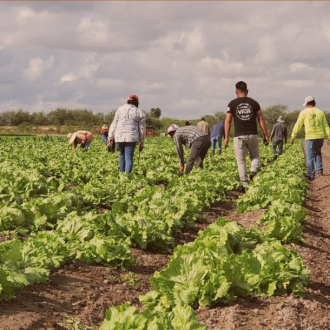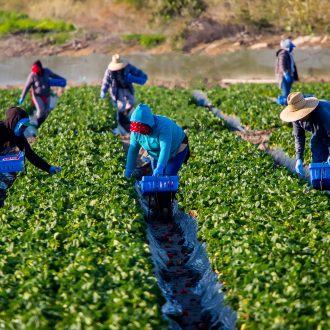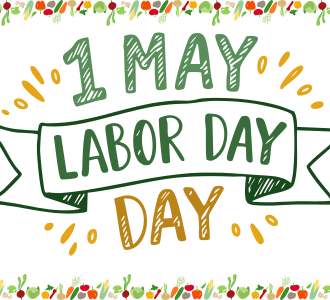
Farm Worker Updates
is The United Farm Workers union (UFW) is working with its members and through their contracts seeking to minimize the financial and health impact of the coronavirus. They and other farm worker partners are currently supporting a bill in Congress. It’s called the HEROES Act and here is what it would do for farm workers:
This bill has passed the House and is in the Senate. Right now, you can sign up to send a message to your Senator here. The Coalition of Immokalee Workers (CIW) has succeeded in getting national attention for the plight of farm workers in Immokalee. Extensive testing was done recently and Covid-19 cases increased tenfold. Doctors Without Borders is currently in Immokalee working to combat the spread of the virus. And they are garnering national attention to the struggle of the farm workers.
The Farm Labor Organizing Committee (FLOC) is focused on developing leadership at farm labor camps, (200 around the state) because they don’t have enough staff to cover all the farms, where they have union members. We all know there is safety in numbers so FLOC organizers are working to create support within the smaller groups of union members where they can. In addition, they have been working with local supporters to collect supplies for farm workers. FLOC was recently the recipient of a collection organized through the local Church Women United group. See below story from Susie Smith.
At the same time our farm worker groups have been doing all they can to provide protection and support for farm workers during the pandemic, some other things have been happening.
California’s Governor Newsom came out with new guidelines regarding pesticide use and the protection of children. A plan to phase out the use of chlorpyrifos that includes financially supporting farmers in a transition to healthier, more sustainable pesticides was also released.
See more here: California Acts to Prohibit Chlorpyrifos Pesticide
In New York State, Rural and Migrant Ministries has been working with two powerful unions to develop relationships with farm workers in the state and to engage them in their Rural Worker-Education Centers. In this collaboration they are committed to systemic change within agri-industries and geographies. Together these groups can strengthen the status of farm workers as the new law is implemented.

“You Can Do This.” by Susie Smith
“You’ve got this.” “We can do it.” Words of encouragement. We say these words to others. They’re also peppered throughout our own self talk. I found myself saying some of these words in connection with our Church Women United (CWU) unit’s project of collecting supplies for migrant farm workers. Right now, since the food supply chains are broken, the need is great. A lot of farm workers are out of work. They have no unemployment benefits or paid leave. No health insurance. There are no stimulus checks for the undocumented. And for all, there is the looming possibility of getting sick. And the housing conditions? For most they are crowded and substandard with state regulations only requiring one wash tub for every 30 workers and one shower for every ten workers. Hard to wash hands and keep clean. A woman in our CWU unit had a spark of an idea. What about collecting disinfecting/sanitizing supplies for farm workers? We went with it. We made a plan. We would set up our collection site on a church parking lot. We did publicity for two weeks prior to the date hoping that the call would expand from the women in our unit out to the churches and beyond into the community. At first, I had doubts about it all. Where would folks get any sanitizing supplies to donate? Each week on my few trips to the grocery store I looked down the aisles for the cleaning sprays and hand sanitizers. Empty. And more empty. Each week empty. And then I got a call one morning from a woman in our unit. She had gone to the store at the early morning “senior” hour beginning at 6:00 a.m. On the phone she sounded excited just like she had found a buried treasure. Yes, at that early hour there were some hand sanitizers and bleach – although with buying limits. Other women shared their hunting successes. The word got out. On the collection day our women were there in the parking lot in shifts receiving supplies from the cars driving up. I was a bit worried. “Would this just be a good idea that fizzles out?” Would our collection just be a meager offering? Nope, not at all. Every few minutes a car came by to donate. We inventoried each bottle of bleach, each bottle of liquid hand soap, each bottle of Pine-Sol, each bar of soap, etc. An outpouring from many who were eager to help. At the end of the day there were three cars plus part of a fourth filled with supplies for the migrant farm workers living in camps in Eastern North Carolina. One young couple drove up and donated supplies. An hour later their mother came driving by to donate a bag of old bath towels that could be used for cleaning. Another hour went by. The mother came back with more supplies saying that the grandmother wanted to donate, too – a bag full of motel size small lotions and shampoos. Giving was contagious even between generations. Some people said that they had heard about the donation on “Next Door”. It was a spark originating from our CWU unit that became whole community action to help people in need. My words to you, “You can do this.” You can do this, too.

Congratulations to the Equitable Food Initiative!

OCIC: VIRTUAL FUNDRAISER TO SUPPORT UNITED FARM WORKERS
The Orange County Interfaith Committee to Aid Farmworkers would have gathered this May for their annual fundraiser to support the United Farm Workers. Given current events, the OCIC has moved their fundraiser to an online platform.
You can purchase “tickets” here, or view/bid on silent auction items here. The event ends June 1!

Op-Eds: The Power of the Pen (or Pixel)
A powerful way to convey concern to a public audience is by writing an Op-Ed, or Letter to the Editor, of a newspaper, magazine, or online publication.
One of the major concerns farm worker advocates have for our current times is the possibility that through legislation, regulation or failure to monitor, farm worker wages will be reduced to offset the economic impact of the coronavirus pandemic. No legislation passed so far has provided particular relief for farm workers, and, in fact, excludes them from receiving any financial assistance if they lack documentation. Much of the information about rights and services is provided exclusively in English, making this information inaccessible to most farm workers who speak/read only Spanish. We intend to monitor this in the coming weeks and months.
A few recent published efforts written by friends and supporters:
NFWM: Stay Connected!
We are in the midst of switching to a new communications system in order to stay better connected with YOU! Please be patient with us during this time of transition, and help us make sure we have the best addresses for you….if this isn’t reaching you at your preferred address, please let us know by emailing us at nfwm@nfwm.org. Additionally, please make sure we have your correct mailing/postal address so you can receive our newsletters, financial updates, and more!
Other ways to stay connected with NFWM:
Bookmark these links and share with your friends!
We are living in unprecedented times. The challenges facing farm workers are not at all unprecedented. Your financial donations during this time are CRITICAL to keep us going. The easiest and safest way to support the National Farm Worker Ministry and farm workers is to give online:
NFWM Supports these boycotts led by our Farm Worker Partners:
|








